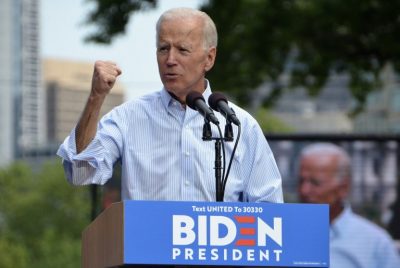Biden’s COVID “Supply Commander” Is Bad Medicine

Included in his plans to fight the coronavirus, presumptive president-elect Joe Biden has pledged to appoint “a fully empowered supply commander in charge of filling in the gaps” in the production and supply of “essential” items needed to fight the virus.
On his website, Biden elaborates on his plan, declaring that his “supply commander” would “take command of the national supply chain for essential equipment, medications, and protective gear.”
This very Soviet-sounding position is necessary, Biden insists, because “We can no longer leave this to the private sector.”
Leaving aside Biden & Company’s laughable assertion that America’s medical industry reflects any sort of unfettered laissez-faire operation, his proposal for a centralized, command-driven medical “supply chain” under the direction of a government commander betrays a stunning ignorance of the complex and interconnected patterns of production and exchange that make up the economy.
As George Mason University economist Don Boudreaux explained in an April 2020 article published by the American Institute for Economic Research,
“The first reality is that, in our modern economy nearly every productive enterprise is connected to every other productive enterprise. This connectedness is the phenomenon alluded to by the term ‘supply chain.'”
But this term, however, is “highly misleading,” Boudreaux wrote. “Today’s economy is not a series of supply chains running side by side with each other, each largely distinct from, and independent of, the others.”
“Instead of a collection of distinct supply chains,” he continued, “our modern economy is a single globe-spanning web of interconnectedness. Within this web every output is the product of countless inputs and each kind of input typically is used to produce countless different kinds of outputs.”
The complex nature of this process of deploying a dizzying array of scarce resources with alternative uses for use in different finished products does not occur in cleanly separated and hermetically sealed “supply chains.”
“This web of interconnectedness—the complexity of which is beyond human comprehension—is indispensable for our modern mass prosperity. Yet its existence—its ‘everything-is-connected-in-some-way-to-everything-else’ reality—means that there are no objective and clear lines separating ‘critical supplies’ from ‘uncritical’ ones,” Boudreaux added.
To help clarify the interconnectedness of our economy, Leonard Read’s classic 1958 essay “I, Pencil” can prove instructive.
When asking what will be considered “essential equipment, medications, and protective gear,” we must further examine the inputs required to produce these items.
Read highlighted how the pencil requires cedar wood from Oregon, which in turn requires saws and trucks and ropes to transport the raw wood to the sawmill in California, which itself requires steel for its equipment along with electricity, land, concrete, and countless other inputs. And that is just the tip of the iceberg for the wood. The lead itself, the rubber for the eraser, and the lacquer for the finish each likewise require many inputs from around the world, all necessary in order to complete the pencil.
Now imagine just how complex the processes are for producing medications, medical equipment, and protective gear. And the inputs required to produce these items will also require other inputs. If we trace back the process far enough for items like medicine and medical equipment, the list of raw materials, capital goods, labor, etc. that need to be diverted from other uses, the list would become unfathomable—certainly so for any single “supply commander.”
Moreover, not just the production process itself, but also the distribution and storage of such “essential” goods to hundreds of millions of people and healthcare workers across the nation will require substantial resources.
Importantly, nearly every resource directed to the production and distribution of these “essential” items will have alternative uses for which they will no longer be available. The result is that the “supply chains” for each and every one of these alternative products and inputs will be impacted, for instance in the form of shortages or inflated prices.
How many of these impacted items would also be considered “essential,” but for noncovid purposes? For instance, other lifesaving medicines or critical medical supplies, or food supplies? And to what degree?
No central authority could possibly know this; indeed, the top-down “supply commander” model could end up doing more harm than good.
Too often, progressives and other interventionists view an unhampered market as “chaos,” something needing to be reined in under the direction of a wise central planner, or “commander.””
However, the impulse to default to centralizing economic decision-making over such a complex ecosystem as the economy is a threat not just to our liberty, but to our well-being. The need for market prices based on private property to freely function and efficiently direct scarce resources to where they are needed most becomes even more critical in times of emergency.
*
Note to readers: please click the share buttons above or below. Forward this article to your email lists. Crosspost on your blog site, internet forums. etc.
Bradley Thomas is creator of the website EraseTheState.com, and is a libertarian activist and writer with nearly fifteen years of experience researching and writing on political philosophy and economics.
Featured image is from The Grayzone

